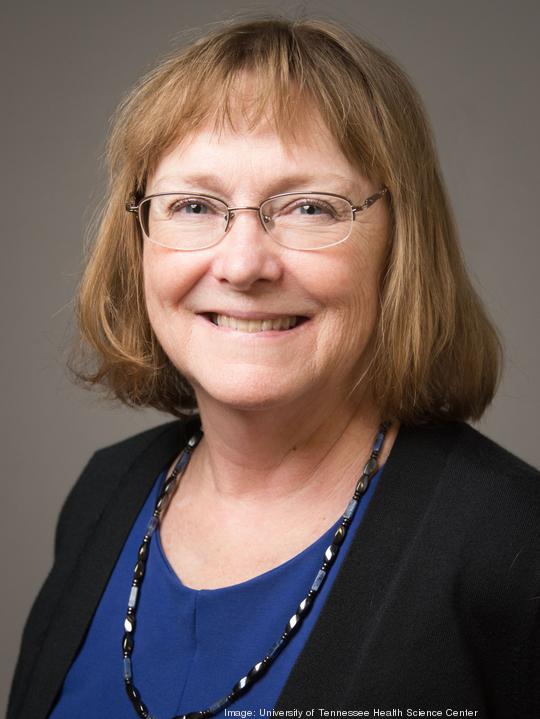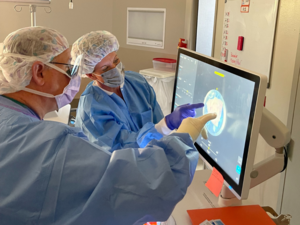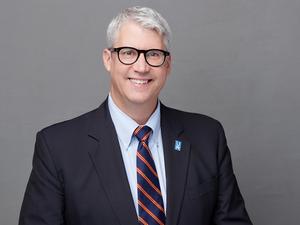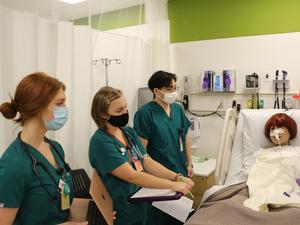
A University of Tennessee Health Science Center (UTHSC) research team has secured a $3.2 million grant from the National Cancer Institute (NCI) to test health technology in managing obesity in disadvantaged groups.
The team, led by Dr. Karen Johnson, endowed professor in women's health and chair of the Department of Preventive Medicine at UTHSC, will receive funding over five years for their latest project named CHAMPS (Choosing Healthy Activities and Lifestyle Management using Portal Support).
The clinical trial will focus on tailoring existing weight-loss strategies and using technology — available in primary care practices — to deliver such strategies to high-risk, underserved populations.
These existing weight-loss strategies have been developed through Johnson's previous work in the Look AHEAD study, which is a long-term, randomized assessment of intensive lifestyle intervention on reducing weight. As the principal investigator of that study for the Memphis site, Johnson said her team was able to assist people who were overweight and obese — and struggling with Type 2 diabetes — in losing over 8% of their body weight in a year.
She said this was achieved through techniques like behavioral change; self-monitoring; education related to increasing their physical activity beyond just exercise; dietary modification; building a support system; and making their efforts a lifestyle change rather than a weight-loss technique.
Her work in the Look AHEAD study found that beyond weight loss, they were also successful in bringing down blood pressure, blood sugar, and even the risk of cancer.
"What we found is the people that lost weight and exercised had a decreased risk of cancer," she said, "and that's huge."
Supportive tech
These compelling findings motivated Johnson and her team to apply for the NCI grant.
"If we could prevent cancer by helping people lose weight, that would be enormous," she said.
With the funding from the NCI, they will take Look AHEAD techniques and make them available to a larger pool of people through primary care-related technology.
In the CHAMPS trial, Johnson's team will use existing attributes of electronic health records (EHRs) such as the ability to digitally connect with study participants and also follow up via individual telephone support to help address concerns.
Additionally, those in the study will have access to calorie-tracking apps like Lose It!, allowing them to log and track their food intake.
"[The app] makes you more self-aware of things and being more self-aware, that's key to successful weight loss," Johnson said.
The obesity epidemic continues to grow around the United States and is a factor behind numerous health conditions like high blood pressure, diabetes, and even cancer. Johnson said she and her team are very excited about the CHAMPS grant from NCI because this is a "particularly bad problem in the state of Tennessee and Memphis and the surrounding area."
Low-income, rural, and minority populations are disproportionately affected by the obesity epidemic due to socio-economic factors and are also at a higher risk of developing and dying from cancer.
According to Centers for Disease Control (CDC) and Prevention data from 2015 through 2017, non-Hispanic Black adults had the highest overall prevalence of obesity (38.4%), followed by Hispanic adults (32.6%), and non-Hispanic white adults (28.6%).
Through using health care technology in her trial, Johnson is making the process of reaching these groups easier and more cost-effective.
"Oftentimes, underserved groups have difficulty accessing that intensive, in-person type of intervention," she said. "If we have an intervention that can be delivered electronically, then we can disseminate it, and it's less labor-intensive."
That's exactly what she hopes to achieve with her new CHAMPS trial.
To that end, Johnson and her team will also partner with community stakeholders in Memphis and surrounding rural areas to test how the approach would work. Currently, her team is in the trial's initial phase and hopes to have the technology set up over the next year.
"We hope to enroll our first trial participants a year from now," Johnson said.









